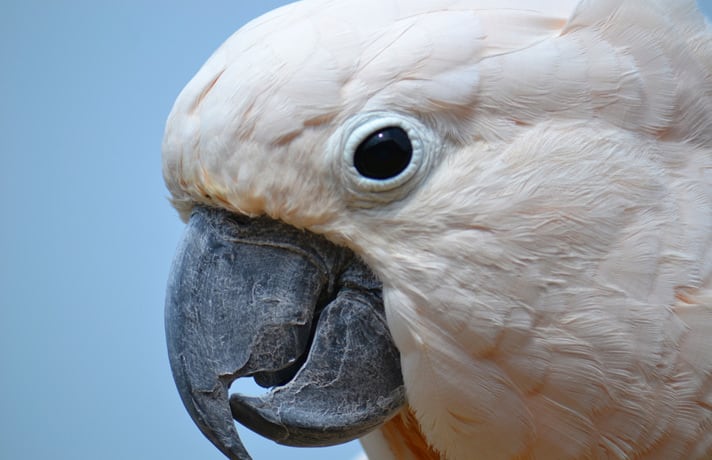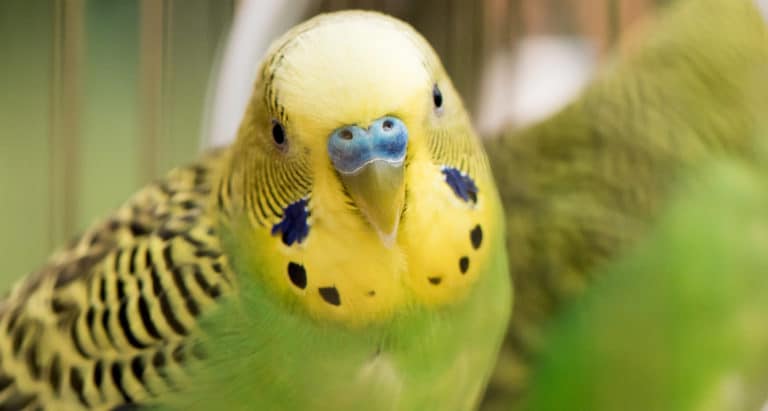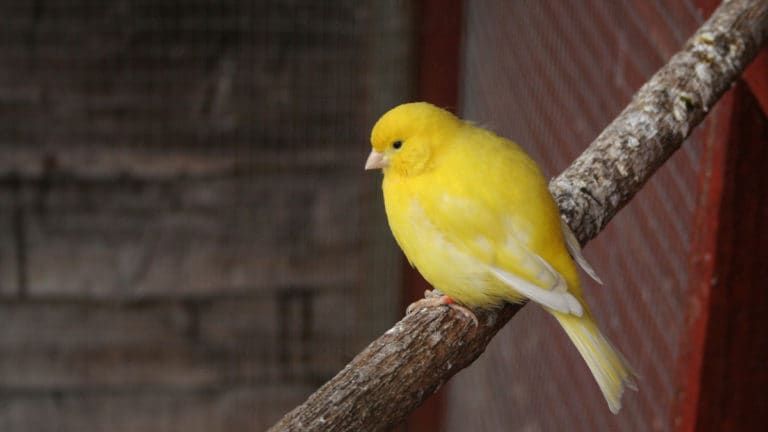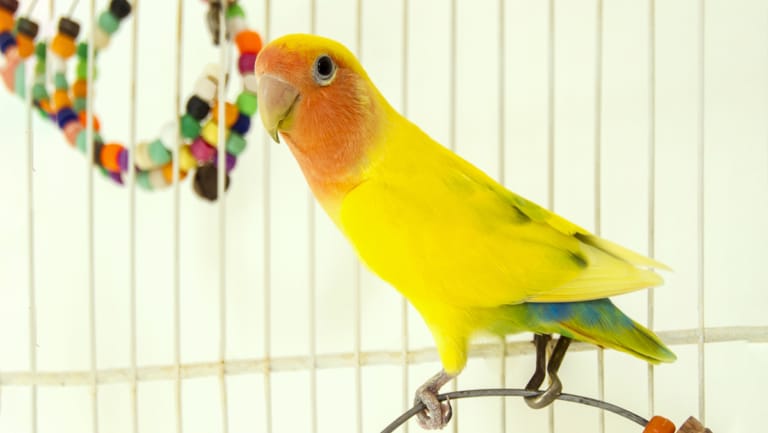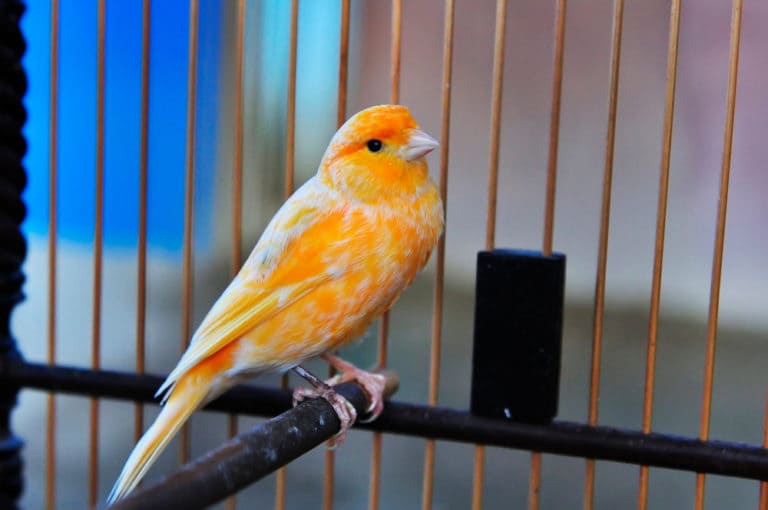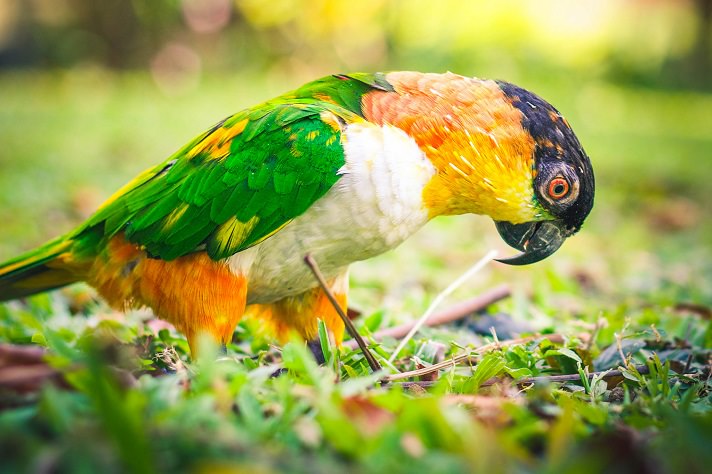1. The Intelligent African Grey Parrot
The African grey is renowned for its ability to speak and not merely mimic. This African parrot is sensitive and able to comprehend and respond to its environment. In addition, they mature quickly and develop strong personalities and senses of humor.
African greys have been known to tell jokes, laugh, count and even speak foreign languages.
Leigh Ann Hartsfield of Massachusetts is an avian care specialist and volunteer at the lab of Dr. Irene Pepperberg, who made her parrot, Alex the African grey, and other African greys famous by teaching them to identify colors, numbers, shapes and materials. Pepperberg discovered that African greys can learn to speak in context and build logical sentences. Now, Alex can recognize and sound out two-letter combinations.
Hartsfield’s own African grey, Pepper, is remarkable in her own right. “She has been known to give my husband Carl what is, quite possibly, the ultimate compliment: ‘Carl, you’re good like cake.’ She came up with the comparison on her own; we’d never said that.”
According to Hartsfield, Pepper uses descriptive words with great accuracy, “which takes the guesswork out of caring for her.” She correctly labels her favorite foods and her fondness for her favorite things. “Pepper not only says ‘I love you,’ but will say exactly what it is she loves. ‘I love Carl’ is a common phrase. Once, we dropped off our cat Simba, and Pepper said ‘I love my big, gray kitty.’ Simba is, by the way, very big and very gray.”
LeAnne Summers of Ontario, Canada, has an African grey, Rafiki, with an ever-growing vocabulary and a natural sense of humor. Not only does he laugh at appropriate times, he also laughs at his own jokes and antics. “He picks up words that amaze us. Rafiki will repeat sentences from the TV when I am home with him, and we will talk back and forth. I continue to teach him all the time, and it is so easy when he is so clever and has such a wonderful disposition to learn.”
Nancy Gallegos of Illinois has a 6-year-old Congo African grey named Felix. “Probably most impressive is Felix’s ability to put words and phrases together that make sense,” said Gallegos. “He also likes to sing and sometimes makes up his own songs. He is so entertaining and continues to learn all the time.” Like other African grey parrots, he likes to laugh and play games. He’s currently working on counting and reciting the alphabet.
2. The Smartest Parakeet, The Budgerigar
Budgerigars, or budgies, are one of the most commonly kept pet bird in the world. Although most parrots will talk and mimic for attention, researchers have recently discovered that budgies have the ability to speak in context. The Budgie Research Group has recorded countless hours of budgie-speak. Victor, the first budgie to be recorded by the group, is said to have had a vocabulary of more than 800 words.
Cheri Collins of Maine has a 1½-year-old budgie named Buddy. He is also one of more than 20 budgies that are currently part of the Budgie Research Group. “The reason he is part of this prestigious group is his ability to speak in context. This talent is not something that was taught to him; it is something that he has always had the ability to do, I only helped him to realize his potential.”
Sarah Cordish is also a member of the Budgie Research Group. Her budgie, Herbert, can say hundreds of words and even makes up his own sentences. “Herbert is a gray budgie, but there is nothing gray about his personality. I once told Herbert that I would let him out of his cage at 4:00 p.m. At 2:30 p.m. I heard him say, ‘I can’t wait until four!’” According to Cordish, he also understands the concept of naming. “Last summer, he was given an aviary-bred hen to raise a family [with] if he wanted. He fell in love with the hen; and the feeling was mutual. I had not named the hen, so Herbert did. What name did he choose? He started calling softly to her, ‘Sarah, Sarah.’ What an extraordinary compliment.”
Budgies are extremely bright and capable of complicated cognitive abilities. Like all pets, they need encouragement and patience in order to encourage their learning process.
3. The Clever Cockatoo
For many people, the cockatoo parrot first entered their hearts through late-night television. They have made numerous appearances and been the foil to talk show hosts such as Johnny Carson and David Letterman. They often won’t talk as much as African greys or budgies but are quite personable and love to play. Cockatoos are also capable of learning complex tricks that many other pet birds seem uninterested in or unable to perform. And trying to find a cockatoo-proof lock for the bird cage can be a challenge, because these very smart parrots are known for their ability to unlatch most standard locks.
Carol Stanley operates the Feathered Nest Aviary in California where she raises rose-breasted cockatoos. She believes cockatoos have an intellectual depth that has barely been acknowledged. Although she raised her cockatoo, Elvis, as a breeder and not as a pet bird, he has an uncanny ability to communicate. “Last year, I passed his flight and heard him in the nest box, laughing, talking and rearranging the furniture. One time, he was on the perch in front of the nest box and his mate, Mimi Posh Bird, jumped out, bumping into him. Elvis immediately cocked his head and turned to her exclaiming, ‘What are you doing?’ in a very irritated manner.”
Kathryn Leake of Virginia has a Moluccan cockatoo named Piper with a curious sense of humor. He can talk and has learned several tricks, including escaping from his cage. Many of these tricks he has taught himself. “He has also learned to ring like a phone in order to watch us run across the room to answer it; after that he will laugh at us.
I sometimes think that he can read my mind. He can tell what I’m about to do, and will do something to either stop me from doing it or to make it harder, and then laugh at my reaction.”
Lee Borgmeier of Illinois believes her medium sulphur-crested cockatoo, Casper, is a good candidate for the most intelligent bird. He has a vocabulary of 50 to 70 words and is able to use them at the appropriate times, even combining words to form coherent phrases. “After I had him for about six months, I thought I had heard all the words he knew. One day when we were sitting on the couch, he leaned toward a grapefruit that I had been eating. I knew he wanted to taste it, so I let him put his tongue on it. He looked at me and said, ‘Grapefruit.’ I almost fell off the couch! I was positive I had never taught him that word.”
By: Anastasia Thrift
Featured Image: Via Michael Koenig/Shutterstock
Share:
